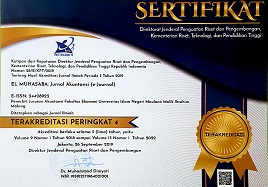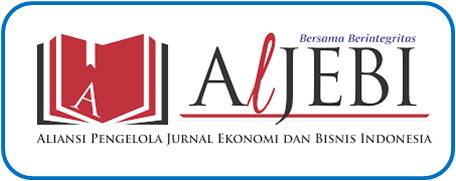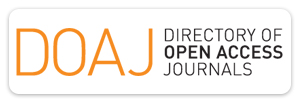ACCOUNTANTS AND AUDITORS' PERCEPTIONS OF TECHNOLOGY AND ATTITUDE OF INTEGRITY IN PREVENTING FRAUD
Abstract
Fraud can be interpreted as fraud which contains the meaning of irregularities and acts against the law, which are carried out intentionally for certain purposes. The role of accountants is often questioned when it comes to financial statement fraud. The audit expectation gap indicates that public expectations are not met for the role of accountants in all fraud cases. This study aims to see if there is a common perception between accountants and auditors in determining the most effective technology and integrity attitude in preventing fraud. Data collection was carried out by distributing a questionnaire link to 110 accounting alumni of the Riau Caltex Polytechnic who graduated from 2015 to 2019 and worked as accountants or auditors. Hypothesis testing is done by using independent sample t-test or different test t-test. The results showed that there were differences in perceptions between accountants and auditors in the selection of technology, namely protection against viruses and the installation of CCTV surveillance camera equipment. However, overall, the results showed no difference. Accountants and auditors have the same perception regarding the attitude of pure integrity which is chosen to be the most effective attitude of integrity to have in order to prevent fraud.
Keywords
Full Text:
PDFReferences
Abd, M., Aziz, E., & Kassem, R. (2010). Fraudulent Financial Reporting : Do Red Flags Really Help ? Journal of Economics and Engineering, 4(82), 69–80.
Ariaty, E., Stie, A., & Bhakti Makassar, W. (2011). PENGARUH PENERAPAN PENGENDALIAN INTERNAL TERHADAP PENCEGAHAN FRAUD PENGADAAN BARANG DAN IMPLIKASINYA PADA KINERJA KEUANGAN ( Studi pada Rumah Sakit Pemerintah dan Swasta di Kota Bandung ). Jurnal Investasi, 7(2), 137–153.
Aripratiwi, R. A., Ludigdo, U., & Achsin, M. (2017). Memaknai Sikap Integritas Akuntan Publik Di Kap “Cemerlang” Surabaya (Studi Fenomenologi). Jurnal Reviu Akuntansi Dan Keuangan, 7(1), 993. https://doi.org/10.22219/jrak.v7i1.13
Azis, N. A., Mangoting, Y., & Lutfillah, N. Q. (2015). Memaknai Independensi Auditor dengan Keindahan Nilai-Nilai Kearifan Lokal Siri’ Na Pacce. Jurnal Akuntansi Multiparadigma, 2012, 145–156. https://doi.org/10.18202/jamal.2015.04.6012
Febriani, F., & Suryandari, D. (2019). Implementasi Fraud Diamond Theory Terhadap Faktor-Faktor Yang Mempengaruhi Kecenderungan Kecurangan (Fraud): Persepsi Pegawai Dinas Kota Tegal. Jurnal Akuntansi, 9(1), 33–46. https://doi.org/10.33369/j.akuntansi.9.1.33-46
Hassink, H. F. D., Bollen, L. H., Meuwissen, R. H. G., & de Vries, M. J. (2009). Corporate fraud and the audit expectations gap: A study among business managers. Journal of International Accounting, Auditing and Taxation, 18(2), 85–100. https://doi.org/10.1016/j.intaccaudtax.2009.05.003
Kalau, A. A., & Leksair, S. (2020). Pengaruh Efektivitas Pengendalian Internal, Ketaatan Aturan Akuntansi dan Perilaku Tidak Etis terhadap Kecenderungan Kecuranngan Akuntansi (Studi pada Perusahaan Badan Usaha Milik Negara di Ambon). Cita Ekonomika, 14(2), 99–110.
Karyono. (2013). Forensic Fraud. Andi.
Moyes, G. D. (2011). The Differences In Perceived Level Of Fraud-Detecting Effectiveness Of SAS No. 99 Red Flags Between External And Internal Auditors. Journal of Business & Economics Research (JBER), 5(6), 9–26. https://doi.org/10.19030/jber.v5i6.2551
Nasirwan. (2011). Telaah Pelanggaran Terhadap Etika Profesi Akuntan : Jurnal Keuangan Dan Bisnis, 3(1), 49–55.
Putu, N. L., Darmayanti, A., Sujana, E., & Kurniawan, P. S. (2018). Metode Deteksi Dan Pencegahan Fraud (Tindakan Kecurangan) Pada Inspektorat Di Bali: Persepsi Auditor Internal. Jurnal Ilmiah Mahasiswa Akuntansi) Universitas Pendidikan Ganesha, 9(1), 2614–1930. https://ejournal.undiksha.ac.id/index.php/S1ak/article/view/20406
Suprajadi, L. (2009). Teori Kecurangan, Fraad Awareness, Dan Metodologi Untuk Mendeteksi Kecurangan Pelaporan Keuangan. Bina Ekonomi Majalah Ilmiah, 13(2), 52–58. http://dinamikahukum.fh.unsoed.ac.id/index.php/JDH/article/viewFile/264/256
Thoyibatun, S. (2012). Faktor-Faktor Yang Berpengaruh Terhadap Perilaku Tidak Etis Dan Kecenderungan Kecurangan Akuntansi Serta Akibatnya Terhadap Kinerja Organisasi. EKUITAS (Jurnal Ekonomi Dan Keuangan), 16(2), 245. https://doi.org/10.24034/j25485024.y2012.v16.i2.2324
Tuanakotta. (2012). Akuntansi Forensik dan Audit Investigatif. Salemba Empat.
Wibowo, W., & Wijaya, W. (2019). Pengaruh Penerapan Fraud Early Warning System (Fews) Terhadap Aktivitas Bisnis Perusahaan. Jurnal Informasi, Perpajakan, Akuntansi, Dan Keuangan Publik, 4(2), 77–111. https://doi.org/10.25105/jipak.v4i2.4463
DOI: https://doi.org/10.18860/em.v13i2.14325
Refbacks
- There are currently no refbacks.
Editorial Office:
Megawati Soekarnoputri Building
Accounting Department, Faculty of Economics
Jln. Gajayana 50 Telp (0341) 558881
E-mail: elmuhasaba@uin-malang.ac.id
Universitas Islam Negeri Maulana Malik Ibrahim Malang
E-ISSN 2442-8922
P-ISSN 2086-1249

This work is licensed under a CC BY SA 4.0 International License

















